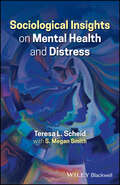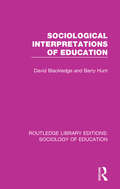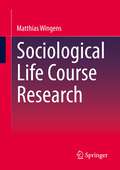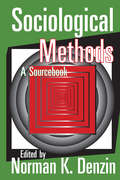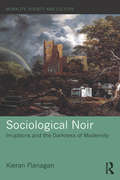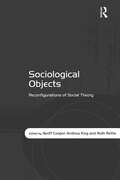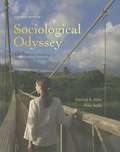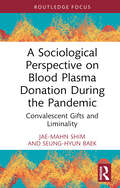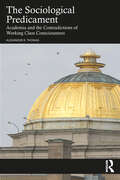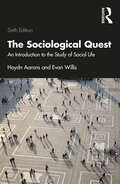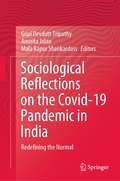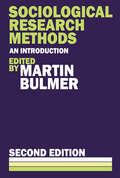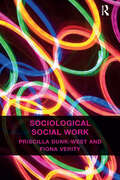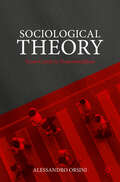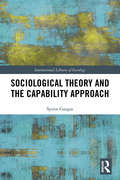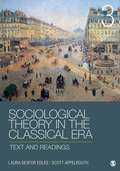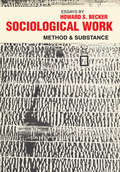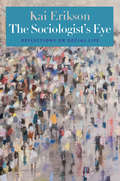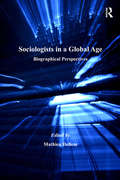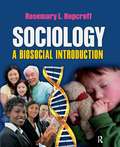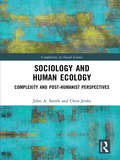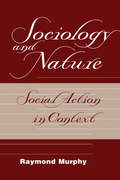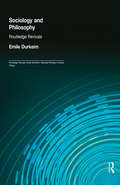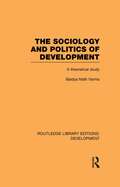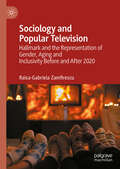- Table View
- List View
Sociological Insights on Mental Health and Distress
by Teresa L. Scheid S. Megan SmithIntroduces students to the study of the social forces that shape mental health and empowers the next generation to make an impact on mental health management As the prevalence of mental health issues worldwide continues to grow, an active area of sociology is investigating the social causes and consequences of mental health and illness. Young people are especially vulnerable to the current mental health crisis—they are more frequently experiencing social isolation, family stressors, difficulties establishing social relationships, and heightened levels of anxiety, depression, loneliness, and suicidal thoughts. Using a relatable and accessible narrative style, Sociological Insights on Mental Health and Distress helps students understand the connections between mental health issues and their social and structural determinants. Integrating classical and contemporary sociological theory, this concise textbook examines mental health from four key sociological perspectives: social context, social integration, stress, and stigma. Special emphasis is placed on the role of social media and cyberbullying in mental health concerns, global sources of anxiety such as COVID-19 and climate change, and emerging topics including neuro-divergencies in mental health problems and suicide in LGBTQ+ and BIPOC communities. Supported by a wealth of pedagogical tools and an extensive companion website, Sociological Insights on Mental Health and Distress is the perfect textbook for undergraduate courses in the sociology of mental health, health and illness, psychological and sociological deviance, and social problems, as well as interdisciplinary courses in criminal justice, public health, social work, and psychology.
Sociological Interpretations of Education (Routledge Library Editions: Sociology Of Education Ser.)
by Barry Hunt David BlackledgeThis book, first published in 1985, provides a clear readable account of the principal sociological approaches to education. It is organised around the three main sociological perspectives on education: the Durkheimian and Functionalist, the Marxist and the Interpretative. It concentrates on the most important and interesting writers within each
Sociological Life Course Research
by Matthias WingensThis introductory book provides an insight into sociological life course research and informs about its theoretical assumptions, analytical concepts and main results. Sociological life course research - like biographical research - has developed into an independent and fruitful field of research since the end of the 1960s. It is true that half a century earlier, in their famous study of "The Polish Peasant in Europe and America" (1918-20), Thomas and Znaniecki had already used life records to examine the connection between social change, social structures, and the life histories of individuals. However, such a research perspective was supplanted by other methodological-conceptual approaches to empirical social research for over fifty years. It was not until the 1960s that sociological interest in life course and biographical theoretical issues reawakened. Today, life course research is considered one of the most important conceptual innovations in sociology in recent decades. The content The life course as a social construction - What is "life course research"? - The life course as an institution - Collective life courses: generations, cohorts and social change - Structures of the life course - Life course research - a conceptual perspective - Life course research, quo vadis? The author Prof. Dr. Matthias Wingens teaches sociology at the University of Bremen, Bremen International Graduate School of Social Sciences (BIGSSS).
Sociological Methods: A Sourcebook
by Norman K. DenzinA comprehensive collection of contemporary and classical readings on sociological method, this book provides students with systematic analyses of each of the major strategies employed in sociological research. It may be used as a supplement or as the basic set of readings for all courses in methods.The book contains thirteen sections dealing with theory and its development; issues of sampling units; problems of developing new measurement techniques; difficulties surrounding the interview (with special emphasis on interviewing deviant, hostile, and silent respondents); the nature of causation; and a review of the major methods of proof available to the sociologist. Actual research studies, focusing in turn on the experiment, the survey, participant observation, life-histories, and unobtrusive analysis, are also included.Each section is preceded by an introduction, that defines the major issues in each paper, offers a discussion of problems not covered explicitly in the readings, and in general shows how each paper contributes to a view of interactional research processes. Because of its interactional approach, its use of classic articles, its anticipation of problems not yet formulated clearly in the literature, its illustrations of how social organizations may be studied, its inclusion of articles relevant to the social psychology of experiments, and its new statements on the ethics of research, this book will be invaluable in methods courses.Especially when used in conjunction with its companion text, The Research Act, the book provides perhaps the most original and most useful compendium available to students today.
Sociological Noir: Irruptions and the Darkness of Modernity (Morality, Society and Culture)
by Kieran FlanaganContrary to secular claims regarding the expulsion of religion, modernity does in fact produce unprecedented forms whose understanding re-casts the relationships between sociology and theology. This book explores ‘irruptions’ which disturb modernity from without: fragments or deposits of history that have spectral – or ‘noir’ – properties, whether ruins, collective memories, or the dark Gothic or the Satanic as manifested in culture. The study investigates what irrupts from these depths to unsettle our understanding of modernity so as to reveal its theological roots. A ground-breaking and extensive work, Sociological Noir explores literature, history and theology to re-cast the sociological imagination in ways that inspire reflection on new configurations in modernity. As such, it will have wide-spread appeal to sociologists and social theorists with interests in religion, theology and debates on postsecularism and culture.
Sociological Objects: Reconfigurations of Social Theory
by Andrew King & Ruth RettieWhat are the aims of sociology? What are its objects of study? How relevant is the classical tradition to the practice of sociology today? This volume brings together internationally renowned and new scholars to consider the changing relationship between contemporary and classical sociology. Arguing that recent historical and theoretical developments make reconsideration timely, it suggests that whilst the classical tradition has a continuing pertinence, it is inevitably subject to ongoing reconfiguration. Assessing the explanatory value of classical and contemporary forms of sociology, interrogating social theory as both a form of explanation and a mode of practice, and considering the possible consequences for the discipline of questions about its subject matter, Sociological Objects steers a course between assertions about radical epistemological breaks on the one hand, and reverence for the classical tradition on the other. Rather, it emphasizes the value of reworking, reconsidering and reconfiguring sociological thought.
Sociological Odyssey: Contemporary Readings In Introductory Sociology (Fourth Edition)
by Patricia A. Adler Peter AdlerSOCIOLOGICAL ODYSSEY: CONTEMPORARY READINGS IN INTRODUCTORY SOCIOLOGY, Fourth Edition, helps bring sociology to life through a wide range of engaging, current articles, covering issues such as Internet dating, the black middle class, homosexuality, the straight edge movement, welfare recipients, and children's clique behavior.
A Sociological Perspective on Blood Plasma Donation During the Pandemic: Convalescent Gifts and Liminality (Routledge Advances in Sociology)
by Jae-Mahn Shim Seung-Hyun BaekShim and Baek examine the evolving existential meanings of gift-making by interviewing donors of convalescent blood plasma during the Covid-19 pandemic.The book reveals what plasma donation means for their efforts to reassemble their lives from being liminal moments to livable experiences, through interviews with convalescent donors in South Korea. It shows it is the very multiplex meanings of plasma donations that enabled people to effectively maneuver through the challenging liminality in life during COVID-19, by expanding the existing literature of gifts and donation that highlights the rich, complex meanings of the body parts donated. It presents a vivid dialogue between liminality and gift-making from varied narratives.A vital read for scholars, students of sociology, anthropology, and public health and those interested in how subjects reconstitute their agency amid uncertainty inside and outside the pandemic, so that we appreciate the voices of donors and learn from the lived experiences of those in this book.
The Sociological Predicament: Academia and the Contradictions of Working Class Consciousness
by Alexander ThomasA sociological phenomenon afflicts sociology itself: academics think of themselves as the vanguard of the working class despite the fact that they are not working class, as the noble willingness to side with the oppressed contrasts scholars’ reliance on authority to bolster their politics.While there are no simple solutions to this contradiction, a necessary beginning is for sociologists (and other academics) to acknowledge the reality of their own class privilege as members of the professional-managerial class. The Sociological Predicament is then a conscious and deliberate work of professional self-loathing that traces the evolution of ideologies found in academia from the mid-twentieth century to today, which demonstrates the ways in which biases around class have given short shrift to the concerns of working class Americans in deindustrialized cities and towns that have ultimately turned away from and then against them.Intellectuals have not historically been on the side of the oppressed but have been instrumental in developing ideologies that sustain the status quo, and this book crucially asks whether academics’ presence on the left ultimately serves conservative ends.
The Sociological Quest: An Introduction to the Study of Social Life
by Haydn Aarons Evan WillisStarting Sociology can be daunting. This user-friendly introduction takes the reader on a quest towards a sociological understanding of the world we live in. Using contemporary examples, The Sociological Quest asks what is distinctive about the way Sociologists view society. Haydn Aarons and Evan Willis show that they are concerned with the relationships between the individual and society, and that a sociological analysis involves an approach which is historical, cultural, structural, and critical. This sixth edition has been thoroughly revised and updated and includes new material on identities, social change, social movements, populism, climate change, the COVID-19 pandemic, digital interaction, and social media. Also included in the sixth edition is an expanded chapter on empirical research in Sociology and the research process, as well as a new chapter on careers in Sociology.
Sociological Reflections on the Covid-19 Pandemic in India: Redefining the Normal
by Gopi Devdutt Tripathy Anurita Jalan Mala Kapur ShankardassThis book presents a sociological study of the COVID-19 pandemic in the context of India. It invites readers to understand disasters and crises as triggers of radical transformations in society, changing the very nature of every day and the meaning of normal. It discusses the processes through which society accepts, internalizes and reinvents a new way of life. It provides insights into its impact on the individual, family, economy and the state and the relationships not only between them but also within them. The chapters draw attention to the concerns of the vulnerable sections of the population – the aged, children, women, the disabled, migrant labour and the economically backward classes. The chapters are written in an engaging style, and each chapter investigates the way societies think about the risk, threat and harm and the ways to navigate crises of all kinds. As such, the book provides a key read for academics, students and administrators, as well as general readers confronted by an existential crisis caused by the pandemic.
Sociological Research Methods: An Introduction
by Martin BulmerA rich source of ideas about sociological research methods to assist the researcher in determining what method will provide the most reliable and useful knowledge, how to choose between different methodologies, and what constitutes the most fruitful relationship between sociological theories and research methods.
Sociological Social Work
by Priscilla Dunk-West Fiona VeritySociological social work is a lifelong social work practice which is animated by a sociological perspective. Social workers 'shorthand' orientations such as 'strengths perspective', 'task centred' or 'humanistic' (to name but a few), as a way to identify their philosophical and theoretical approaches in professional life. Whilst some texts have examined sociology for social work, this text instead proposes that sociological social work is a legitimate and theoretically rich orientation, and this book demonstrates what sociological social work looks like in our rapidly changing world. This text will equip students and practitioners with a way to think sociologically, not just while they are studying, but as an ever present reference for making sense of social work purpose and how this is realised in a transforming world. This follows an established tradition in social work literature, but this book elevates and names the importance of this approach, which we argue is critically needed if social work is to achieve its agenda in transformative social, political economic and environmental contexts. The current landscape in which we live is one that is characterised by rapid changes which have implications for the life experiences of those with whom social workers work, social justice advocacy agendas, and for fulfilling the purpose of social work more generally. This book is essential reading for those looking to keep up with these changes.
Sociological Theory: From Comte to Postcolonialism
by Alessandro OrsiniThis textbook analyses the work of classical and contemporary sociological theorists. The first part is dedicated to Comte, Spencer, Marx, Durkheim, Weber, Pareto, and Simmel. The second part covers the major contemporary sociological perspectives: Functionalism, Marxism, Conflict Theory, Symbolic Interactionism, Phenomenological Sociology, and Rational Choice Theory. The third part is devoted to Postmodern Theory, Feminist Theory, Postcolonial Theory, and Race Theory. The author combines academic rigour with clear and accessible language, offering students an in-depth and extensive overview of the main, recurring problems that have troubled sociological theory from its origins to the present day. The textbook uses contemporary examples, analysing how sociological theory can explain the most tragic phenomena of our time, including the war in Ukraine, the Israeli-Palestinian conflict, US-China competition over Taiwan, nuclear proliferation, radicalization, neofascism, white suprematism, jihadism, and terrorism. With pedagogic features aiding learning, this book helps navigate the various approaches, methods, and research that divide sociologists into distinct schools. This textbook is therefore an invaluable tool to any sociology student looking to gain a comprehensive understanding of the foundational thinkers that have shaped the discipline.
Sociological Theory and the Capability Approach (International Library of Sociology)
by Spiros GangasSociological Theory and the Capability Approach connects normative strands of sociological theory to the fusion of ethics and economics proposed by Amartya Sen’s and Martha Nussbaum’s capability approach. Spanning classical (Hegel, Marx, Durkheim, Scheler, Weber) and contemporary debates (Parsons, Giddens, Luhmann) it identifies areas that bridge the current gap between sociology and capability approach. It thus builds on explanatory and normative concerns shared by both traditions. Engaging readers from sociology and capability approach, Spiros Gangas suggests that the proposed dialogue should be layered along the main areas of value theory, economy and society, extending this inquiry into the normative meaning attached to being human. To this end, the book reconstructs the notion of agency along the tracks of Nussbaum’s central human capabilities, considering also alienation and the sociology of emotions. It concludes by addressing the capability approach through the lens of social institutions before it takes up the challenge of ideological fundamentalism and how it can be effectively confronted by capability approach. This original book provides a fresh perspective on capability approach as it embeds it in the rich pool of sociological theory’s accomplishments. As an exercise in theoretical and normative convergence, it will be required reading for academics and students in social theory, cultural theory, philosophy and human development studies.
Sociological Theory in the Classical Era 3rd Edition
by Laura Desfor Edles Scott AppelrouthSociological Theory in the Classical Era introduces students to original major writings from sociology's key classical theorists. It also provides a thorough framework for understanding these challenging readings. For each theorist, the authors give a biographical sketch, discuss intellectual influences and core ideas, and offer contemporary examples and applications of those ideas. Introductions to every reading provide additional background on their structure and significance.
Sociological Work: Method and Substance
by Fanny GinorHoward S. Becker is a leading contemporary sociologist who interprets society as collective action and sociology, therefore, as the study of collective action. This volume explores the theory and methods necessary to study collective action and social interaction. Becker includes most of his work on theory and method that has not previously appeared in book form. It reflects his unique way of thinking about and studying society.The first part of the book treats methodological problems as problems of social interaction and lists a series of research problems requiring analytic attention. The second part illustrates Becker's approach through full reports on two of his major research projects. Four theoretical statements on how people change comprise the third part, and the fourth part includes important contributions to the study of deviance. These essays illustrate the need to study deviance as part of the general study of society, not as an isolated specialty.Sociological Work is an important statement of the distinctive theoretical and methodological views associated with the Chicago School of Sociology; it shows a deep concern with the first-hand study of processes and human consequences of collective action and interaction. This illuminating volume is an engaging introduction to some of the issues of importance to sociologists and those interested in the studies of collective action and deviance, and it is well adapted to use in courses in these areas.
The Sociologist's Eye: Reflections on Social Life
by Kai T. EriksonA masterful introduction to and appreciation of sociology as a window into our world The culmination of a distinguished career, this fascinating exploration into the nature of human social life describes the field of sociology as a way of looking at the world rather than as a simple gathering of facts about it. Kai Erikson notes that sociologists look out at the same human scenes as poets, historians, economists, or any other observers of the vast social landscape spread out before them, but select different aspects of that vast panorama to focus on and attend to. Erikson’s lively and accessible volume considers how sociology became a field of study, and how it has turned its attention over time to new areas of study such as race and gender and what Erikson calls “social speciation.” This book provides readers with new ways of thinking about human culture and social life—an exhilarating sense of what the world looks like when viewed with a sociologist’s eye.
Sociologists in a Global Age: Biographical Perspectives
by Mathieu DeflemSixteen leading international sociologists are brought together in this volume to share their experiences of becoming practitioners in the field. Selected for their comparative and transnational interests and experiences, the contributors include Martin Albrow, Karin Knorr Cetina, Diane E. Davis, Pierpaolo Donati, Leon Grunberg, Horst J. Helle, Eiko Ikegami, Tiankui Jing, Hyun-Chin Lim, Ewa Morawska, Richard Münch, Saskia Sassen, Joachim J. Savelsberg, Piotr Sztompka, Edward A. Tiryakian and Ruut Veenhoven. Each contributor provides an auto-biographical review of their journey into the discipline, with special attention paid to the intellectual and social-political contexts in which their work matured. Each chapter concludes with a commentary on the anticipated future direction of that particular sociological area. These original and reflective contributions provide fascinating and rare insights into the careers of sociologists living in a global age.
Sociology: A Biosocial Introduction
by Rosemary L. HopcroftIn an era of human genome research, environmental challenges, new reproductive technologies, and more, students can benefit from an introductory sociology text that is a biologically informed. This innovative text integrates mainstream sociological research in all areas of sociology with a scientifically-informed model of an evolved, biological human actor. This text allows students to better understand their emotional, social, and institutional worlds. It also illustrates how biological understanding naturally enhances the sociological approach. This grounding of sociology in a biosocial conception of the individual actor is coupled with a comparative approach, as human biology is universal and often reveals itself as variations on themes across human cultures.
Sociology and Human Ecology: Complexity and Post-Humanist Perspectives (Complexity in Social Science)
by John A Smith Chris JenksTraditionally, Sociology has identified its subject matter as a distinct set – social phenomena – that can be taken as quite different and largely disconnected from potentially relevant disciplines such as Psychology, Economics or Planetary Ecology. Within Sociology and Human Ecology, Smith and Jenks argue that this position is no longer sustainable. Indeed, exhorting the reader to confront human ecology and its relation to the physical and biological environments, Smith and Jenks suggest that the development of understanding with regards to the position occupied by the social requires, in turn, an extension of the component disciplines and methodologies of a ‘new’ human socio-ecology. Aiming to evoke critical change to the possibility, status and range of the social sciences whilst also offering essential grounding for inter-disciplinary engagement, Sociology and Human Ecology will appeal to postgraduate students and postdoctoral researchers interested in fields such as Social Theory, Socio-Biology and Ecological Economics.
Sociology And Nature: Social Action In Context
by Raymond MurphySociology as if nature did not matter has been the sociological expression of modern societies negligent of the processes of nature. In response to this ?ecological blindness,? Raymond Murphy examines the limitations of sociology that have resulted from this neglect.Humanity's success in manipulating nature destabilizes the natural support system of society on a planetary scale and, in turn, destabilizes all of society's institutions. Because the manipulation of nature has become so central to modern society, society, Murphy argues, can now be understood only in terms of the interaction between social action and the processes of nature. The growing awareness that social constructions unleash dynamic processes of nature?processes beyond human control that bear on social action?has the potential of radically transforming sociology. Sociology and Nature proposes the reconstruction of sociology in which nature does matters, developing a novel sociological approach that situates social action in its natural context.
Sociology and Philosophy (Routledge Revivals: Emile Durkheim: Selected Writings in Social Theory)
by Emile DurkheimFirst published in English in 1953, this volume represents a collection of three essays written by seminal sociologist and philsopher Emile Durkheim in which he puts forward the thesis that society is both a dynamic system and the seat of moral life. Each essay stands alone, but their connecting thread is the dialectic demonstration that a phenomenon, be a sociological or psychological one, is relatively independent of its matrix. The essays provide a valuable insight into Durkeheimian thought on sociological and philsophical matters and offer an excellent guide to Durkheim for students of both disciplines.
The Sociology and Politics of Development: A Theoretical Study (Routledge Library Editions: Development)
by Baidya Nath VarmaOriginally published in 1980, this work answers the crucial question of how social change should be guided in the developing countries. Professor Varma begins by posing the problems of the general scope of modernization and the general criteria used in the modernization process. He examines carefully some of the models that have been used for this purpose in the past, providing extensive summaries of the views on modernization of theorists in various social science disciplines, including sociology, politics, economics, and anthropology, and stresses the importance of these views in guiding policy decisions. The book concludes with a comparison of the development processes of the United States, the Soviet Union, China, Japan and India.
Sociology and Popular Television: Hallmark and the Representation of Gender, Aging and Inclusivity Before and After 2020
by Raisa-Gabriela ZamfirescuThis book examines representations of gender, age and identity across the Hallmark film and television output in relation to specific periods of time that pertain to changes within the specific entertainment sector. Using a comprehensive collection of 628 original Hallmark television films released between January 2015 and December 2023, the book applies content analysis to a variety of quantitative, qualitative, and mixed data, including behind-the-scenes credits, actors and actresses, characters and their narratives, promotional posters, Facebook comments, and official synopsis. In addition to examining diversity of race and religion, it analyses ageism through the portrayal of elders and young people in idealized imagery and stereotypes, inclusivity of LGBTQ and disabled characters, and ageism in relation to both masculinities and femininities. This book will be of interest to readers in fields including gender studies and sociology, visual communication, film and television studies, aging, media and communications, and popular culture.
